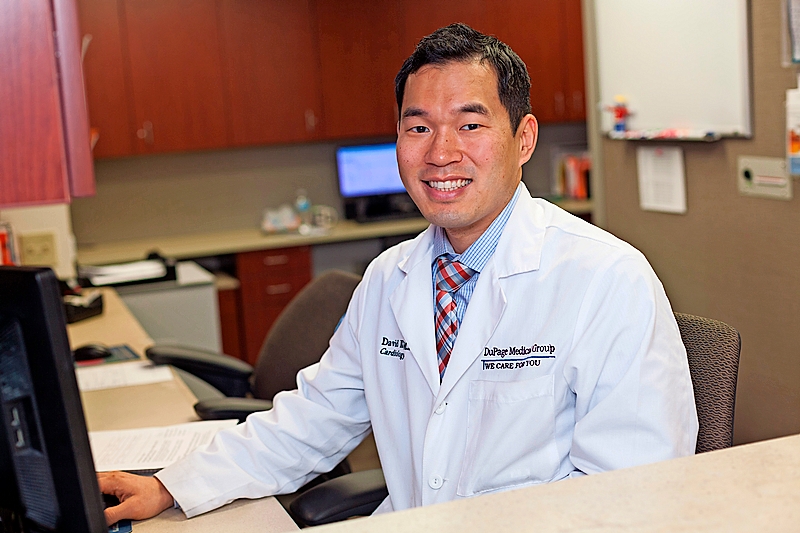Holistic Health
By Kathy Aabram
Appears in the February 2018 issue.

Cardiologist David Kim’s enthusiasm, practicality and compassion make him an inspiring health expert. This Chicagoland native graduated with honors from Northwestern University Feinberg School of Medicine in 2005 and continued his education at Vanderbilt University School of Medicine in Tennessee. His interest in cardiology began when he learned early in medical school that heart disease is the number-one killer of Americans.
Dr. Kim promotes a holistic approach in managing acute heart issues at his DuPage Medical practice, including psychological and physical well being.
What is one simple thing people can do to improve their cardiac health?
Most people are aware that exercise and diet affects their cardiac health, but they may not be aware of how sleep—specifically, the lack of sleep—impacts their heart health. The average American sleeps 6.8 hours a night, and 40 percent of Americans get less than six hours a night. Sleeping less than seven hours per day is associated with an increased risk of developing cardiovascular disease and coronary heart disease.
The goal should be to sleep at least seven hours a night. It’s a discipline to sleep. For most of us that means forgoing Netflix or YouTube. It can be difficult, but the important thing is to work toward increasing your sleep to get seven hours a night on most nights.
What is a common misconception people have about taking care of their heart?
A lot of people think that because they have heart disease they need to take it easy. The American Heart Association recommends a brisk walk for 30 minutes, five days a week. That is more effective than one big walk once or twice a week. For your walking pace to be brisk, you need to be breathing harder than usual while still being able to speak in full sentences.
There’s a myth that people with heart disease should take it easy, and as a result, they don’t exercise. With a doctors’ approval, those with heart disease should exercise daily.
What screenings are important when it comes your heart health?
The most important tests to have are blood pressure and cholesterol—both can indicate cardiac risk factors. The better these two are controlled, the better the results. Recently the blood pressure optimization changed to 130 over 80. If you are put on medication to control your cholesterol or blood pressure, it’s important to follow up with your doctor so the medication can be fine-tuned. Ultimately, the goal is to get your blood pressure under 130 over 80 to reduce cardiac events.
What are you passionate about when educating patients?
A healthy lifestyle is much more than a healthy body or the physical things we can measure. The physical part of a person’s heart health is easy—there are a lot of medical tests and metrics to see how a patient is doing. Gauging other aspects of health is difficult, like the spiritual and emotional areas of a person’s life. Because they are not easily measured, we tend not to give them as much importance.
Spending time with people we love, and doing things we enjoy, is a good investment in our health. It’s not by accident that it’s often said, “Laughter is the best medicine.”
DuPage Medical Group Cardiology | Dr. David H. Kim
100 Spalding Drive, Suite 400, Naperville | 630.718.2660 | dupagemedicalgroup.com
Common Heart Attack Warning Signs
Don’t wait to get help if you experience any of these heart attack warning signs. Although some heart attacks are sudden and intense, most start slowly, with mild pain or discomfort. Know your risk factor and pay attention to your body. Call 911 if you feel:
Chest discomfort. Most heart attacks involve discomfort in the center of the chest that lasts more than a few minutes, or that goes away and comes back. It can feel like uncomfortable pressure, squeezing, fullness or pain.
Discomfort in other areas of the upper body. Symptoms can include pain or discomfort in one or both arms, the back, neck, jaw or stomach.
Shortness of breath with or without chest discomfort.
Other signs may include breaking out in a cold sweat, nausea or lightheadedness.


